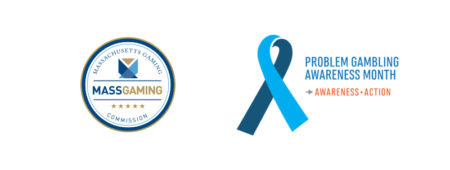March is Problem Gambling Awareness Month; MGC encourages ‘Awareness + Action’
- March 05, 2019
- by MGC Communications
- 0 comments

The Massachusetts Gaming Commission recognizes March 2019 as Problem Gambling Awareness Month. Established 15 years ago by the National Council on Problem Gambling, PGAM is a national outreach campaign designed to educate the public about problem gambling and the resources available. The MGC is pleased to present a series of new initiatives in honor of this month, which is dedicated to awareness building and advocacy.
This year’s PGAM theme of “Awareness + Action” aims to generate awareness about the risks of gambling and urges action toward hope and recovery for those in need.
With the passage of the Expanded Gaming Act, Massachusetts legislators mandated a robust research agenda on the economic and social impacts of expanded gaming in the Commonwealth. In 2013, the MGC engaged and funded a team at the University of Massachusetts Amherst to conduct a first-ever, multi-year study of the Social and Economic Impacts of Gambling in Massachusetts (SEIGMA). The SEIGMA team conducted a baseline study on the prevalence of problem gambling in Massachusetts prior to casinos and determined that it was similar to other prevalence rates across the country. The Massachusetts prevalence rate of problem gambling is approximately 2 percent of the adult population. The baseline study further indicated an additional 8.4 percent of the state’s population is considered at-risk gamblers, and about 1 in 5 Massachusetts adults reported knowing someone who they considered gambling too much. Thus far, updated SEIGMA research finds that no significant changes in problem gambling have occurred in the host or surrounding communities after the 2015 opening of Plainridge Park Casino.
In recognition of PGAM 2019, MGC presents the following activities:
PREVENTION: This month SEIGMA researchers will release evidence-based guidelines designed to help Massachusetts residents make informed decisions about gambling behavior. The upcoming report Low-Risk Gambling Guidelines for Massachusetts defines the point at which level of gambling engagement (i.e. frequency and expenditure) increases risk.
RESEARCH: This month the MGC will select organizations to conduct Community-Driven Research. The research objective is to provide communities with the opportunity to define the issue or question relating to the introduction of casino gambling in Massachusetts. This initiative puts the community first and emphasizes collaboration between researchers.
EDUCATION: MGC continues to generate awareness about its popular, responsible gaming program GameSense and is working closely with GameSense Advisors at Plainridge Park Casino and MGM Springfield to host a series of activities for casino employees. As the eyes and ears of the casino, employees play a key role in identifying persons who may be struggling with gambling. Educating casino staff about available programs and resources has increased benefit because research identifies gaming employees as being at a greater risk of developing a gambling problem.
COMMUNICATION: Throughout the month, MGC will implement a digital campaign across its multiple social media channels to promote awareness and educate the public about MGC’s voluntary self-exclusion program and the Massachusetts Council on Compulsive Gambling helpline.
COLLABORATION: Plainridge Park Casino employees will wear GameSense-branded PGAM buttons throughout the month. MGM Springfield produced a “Fact or Myth” video featuring a GameSense Advisor and the educational video will be shown to employees at multiple MGM properties.
SUPPORT: MGC supports the Cambridge Health Alliance’s ‘Gambling Disorder Screening Day’ taking place on March 12, 2019. On the same day, GameSense Advisors will offer problem gambling screening at Plainridge Park Casino and MGM Springfield.
MGC’s Director of Research and Responsible Gaming Mark Vander Linden said, “We acknowledge the tremendous pain and suffering experienced by individuals with a gambling problem and its impact on their loved ones. Because there is no single solution to prevent or cure this disorder, we are committed to a comprehensive approach of prevention and intervention by funding research, creating effective programs and increasing awareness, not only during this important month but all year long.”
More information on MGC’s problem gambling prevention efforts is available at MassGaming.com. If you or someone you know needs immediate help with a potential gambling problem, please visit Massachusetts Council on Compulsive Gambling or call the helpline at 1.800.426.1234.